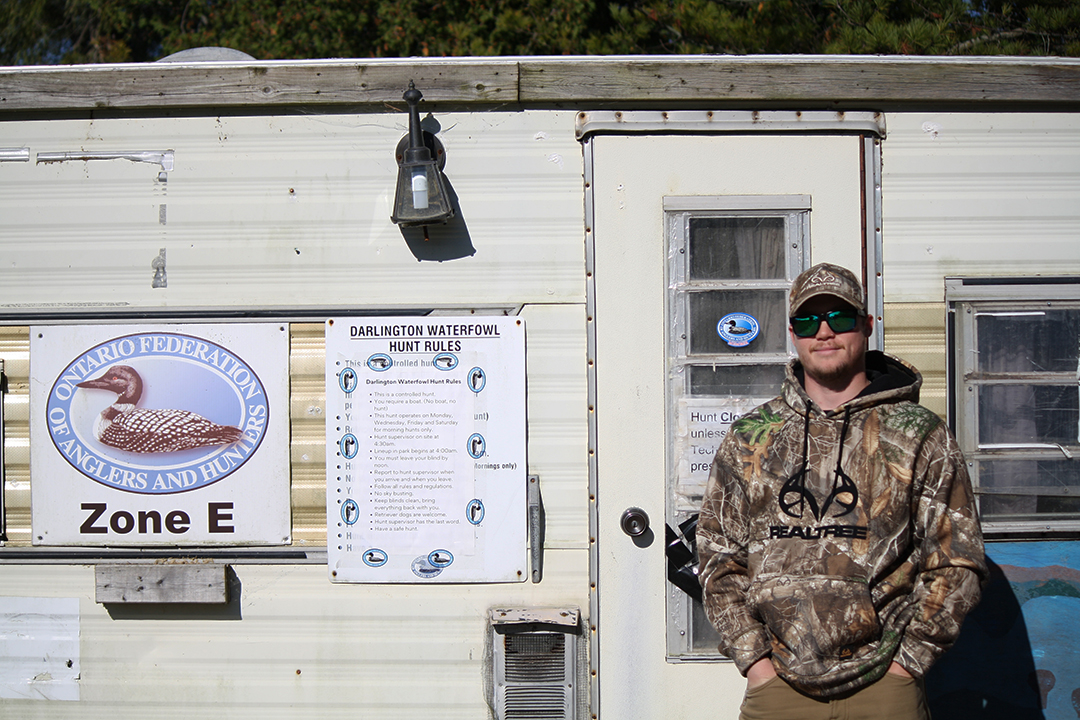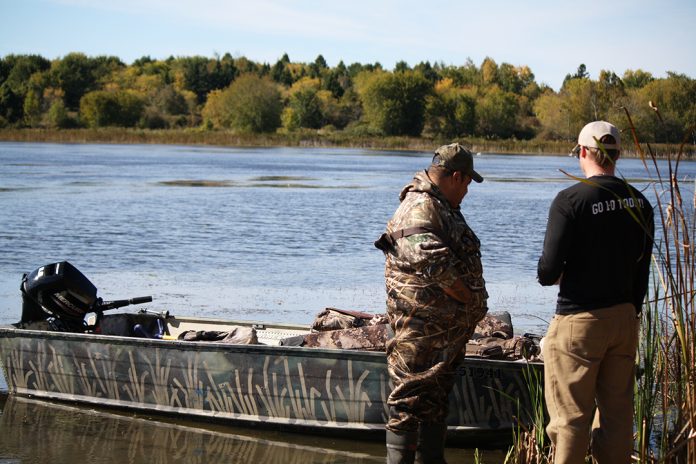Darlington Provincial Park’s annual controlled wildfowl hunt is underway and will continue until Dec. 7. This is a tradition spanning more than 20 years, and for the past three years the hunt has been administered by the Ontario Federation of Anglers and Hunters (OFAH), according to hunt manager Annie Layfield.
Cheyne Fischer is a hunt technician with OFAH who works on-site in a mobile office during hunting hours. He said his day starts at four a.m. when he checks the hunters’ required documents and takes their payment and information before they go by boat to their chosen blind.
The location offers a unique opportunity because it’s in an urban area and also intersects with birds’ migratory pathway along Lake Ontario, said Layfield.
“It’s a hunt that’s really convenient,” she added.
Hunters Sam Peligra and Frank Bonaiuto Jr. agreed with the statement, noting that the convenience is a big consideration for them when choosing to hunt here. Bonaiuto said that Darlington is closer and easier to access than many of his other hunting spots, which are becoming sparse because of urbanization and increased private land ownership.
Additionally, they said that hunting in a controlled space like this one can be less dangerous. Peligra recalled a time when hunters in a nearby blind asked for help when their kayak started sinking. He said that he and his hunting partner took them and their sinking kayak back to shore.
“That’s why this is such a nice place,” he said, highlighting the event’s safety. “I can hunt right out my front door, but I’m on Lake Scugog. If I flip my boat at five o’clock in the morning, there’s nobody out there. What do I do?”
Layfield said these features also make the Darlington hunt appealing to new hunters.
“It’s a good spot to learn,” she said. “If you’re looking to be a hunter but you don’t have a spot to hunt, this is a great place to come and participate.”
Some years, the OFAH even hosts special hunting events in the park in order to encourage new participants, according to Peligra. He said he has been hunting here since 1982, and has been a mentor in youth hunts and hunts for women.
The OFAH also collects data from the hunts. Fischer said the second part of his job involves checking the harvests to ensure the hunters follow regulations and to help inform future OFAH endeavours.

In the world of environmentalism, hunting typically gets a mixed reaction. Animal activists might argue that hunting is cruel and unnecessary, while hunting advocates see it as a source of food and recreation.
Peligra and Bonaiuto said that the killing isn’t the point – they eat what they kill, or give leftovers away to someone else who will eat it.
Studies have found that hunting can have a number of benefits, including increased ecological knowledge for hunters and a greater motivation to conserve land. According to a 2021 report from Greifswald Studies on the Economics of Landscape and Nature Conservation, many hunters are conservationists themselves because they gain a sense of appreciation of nature by spending such long hours immersed in it.
This is definitely true for Bonaiuto and Peligra. They can list a number of moving interactions they’ve had with wildlife while out hunting, including witnessing the migration of Monarch butterflies earlier this year.
“It’s not about killing animals,” Peligra reiterated, saying that his main focus is to enjoy nature and the sunrise. “Everything comes to life in the morning.”
Hunting and conservation have become interlinked, but it’s a balancing act that requires careful consideration. Policies are often controversial. One example is the introduction of a hunting season for cormorants in 2020, which garnered a lot of criticism from experts who argued the birds don’t pose any environmental threat.
Another aspect that needs to be considered is the treatment of Indigenous hunters. Darlington Park sits on land governed by the Williams Treaties, which have been argued to be one of the worst treaties in Canada. When the treaties were formed in 1923, Indigenous people on the land lost their right to hunt and fish according to their traditions.
Since then there have been a series of cases involving treaty nations fighting for more hunting rights, which the OFAH has typically opposed due to their desire for universal hunting laws that apply to everyone equally.
The most recent case resulted in a $1 billion settlement from the government, restoration of Indigenous hunting and fishing rights, a formal apology, and the option for the Williams Treaty First Nations to buy back a portion of land. This was in 2018, after controlled hunts in Darlington had been running for over 14 years.
As the landscape of hunting and conservation continues to evolve, the inclusion of all voices is more important than ever to ensure equitable practices that contribute to a sustainable future.
For more information about the Darlington hunt and how to participate, visit the OFAH’s website.




